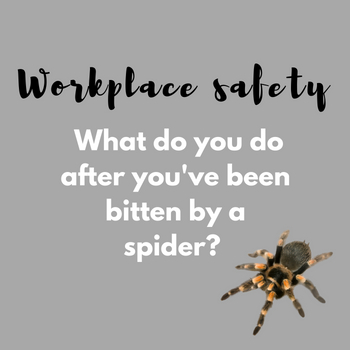
Some spider bites are harmless, while others are deadly. Regardless of what kind of bite you’re dealing with, it’s essential to know how to treat it.
Are you up to date with your spider safety protocol?
Read on to learn how to identify and treat a bite, safely and quickly!
What Bit You?
The good news is, most venomous spiders aren’t aggressive, and won’t bite unless provoked.
Many spiders that do bite don’t have fangs that are strong enough to pierce skin, so many times the result of a spider bite is itchy skin, or red wounds that take a week or so to heal.
The bad news?
Many occurrences of spider bites happen to outdoor workers. If you or your employees work outside, they’re sharing their ‘office’ with spiders of all sizes and breeds. Spider bites are common, but easily treatable. It’s when employees don’t act quickly to treat their spider bite, that serious health complications can develop.
Whether you’re dealing with a tarantula or a wolf spider on the job site, act right away in order to prevent health complications and minimize the pain.
Act Quickly to Avoid Aggravated Symptoms of a Spider Bite
Often times, a spider bite will resemble a bug bite. You may experience itching or burning, and the area around the bite may swell. It’s also important to know the signs of a more serious bite. Getting bitten from a brown recluse or a black widow may result in:
- Joint pain
- Joint stiffness
- Intense pain with or without touching the wound
- Chills, fever, and/or muscle spasms
- Reddened skin, followed by a blister(s)
- Itching for 2-8 hours following the bite
- Nausea or vomiting.
When you seek medical treatment, the time it takes to heal depends on the type of spider that bit you.
Follow these tips after getting bitten, and stay ‘spider safe’ at work!
Step 1: Contact your supervisor. Let your supervisor know that you’ve been bitten. If you are dealing with a poisonous spider, make sure to sit down and elevate the affected area.
Engaging in work activity (or physical activity of any kind) will cause the venom to quickly spread throughout the body.
Step 2: Clean the affected area. Gently clean the bite and surrounding area with wild soap and water. Apply ice to the wound.
Step 3: Ease the pain of blisters. If blisters develop, apply an antibiotic ointment. Just make sure not to scratch the blister (over the counter antihistamines can help with that!)
At Axiom, we believe in providing our clients with a simple solution for employee health. Within minutes of an employee getting injured, employees have access to 24/7 nurse triage directing them to the appropriate level of care–of which (in many cases) the injury can be resolved with first-aid measures!
Contact us today to learn how we can help you manage injuries and occupational health!


Heather lives and writes by the motto, “No coffee, no workee,” and is passionate about helping others live a happier and healthier life. When she’s not writing away, you can find her playing basketball with her two sons, planning her next getaway “somewhere tropical” or trying out a new recipe with chocolate as the main ingredient.
Find out more about our Injury Case Management services or our Occupational Health Programs.










